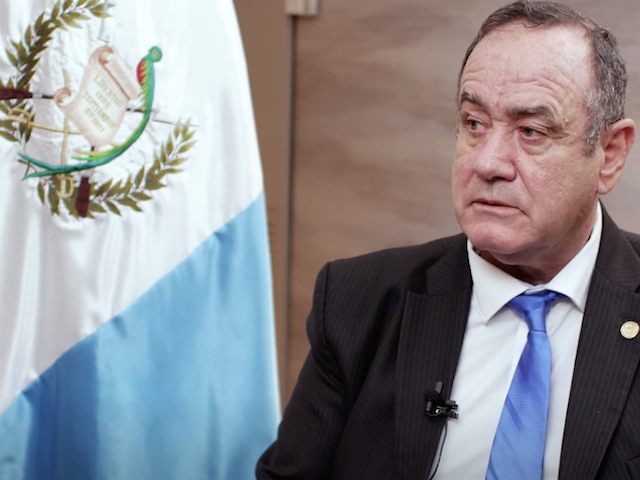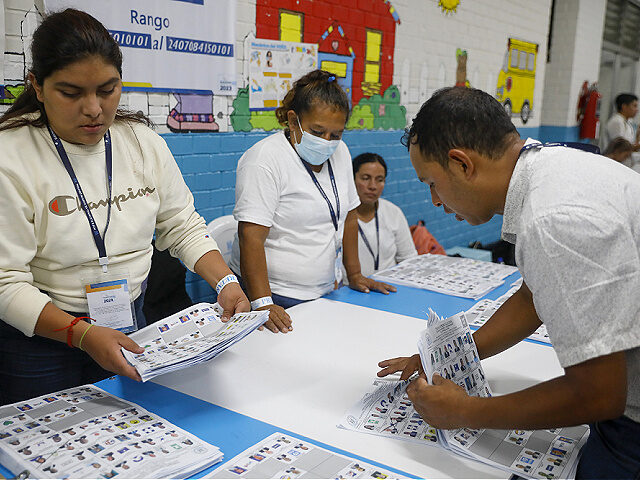Guatemala’s Constitutional Court ordered the nation’s top electoral court to temporarily suspend the officialization of the June 25 presidential election on Saturday evening and ordered it to review the ballots used in the election.
The ruling followed appeals from ten political parties alleging irregularities in the scrutiny process.
The suspension issued by Guatemala’s highest court prevents the adjudication and proclamation of all elected officials until the situation is “clarified,” including the nation’s next president or the top two vote-getters, eligible for a runoff.
Guatemala held general elections on June 25 that resulted in former first lady Sandra Torres of the center-left National Unity of Hope (UNE) and outsider leftist candidate Bernardo Arévalo of the Semilla Movement party heading to a runoff presidential election on August 20. Arévalo’s first-round results were deemed a surprise as all polls released during the campaign forecast that he would not obtain more than three percent of the votes. It also shut all conservative and right-wing options out of the presidency.
The election was also marked by a large number of “null” votes that were greater than the total for any single candidate. The “null” votes were not assigned to any candidate as, according to the nation’s electoral law, they were votes where the voter’s intention could not be determined in the ballot.
The current ruling Let’s Go for a Different Guatemala (VAMOS) party, along with the front-runner UNE party and eight other parties, jointly challenged the presidential election results, filing an appeal at the highest Guatemalan court.
In their appeal, the parties alleged to the Constitutional Court that there is a “risk and imminent threat” that elected positions may be awarded without the electoral board authorities being “aware of the defects” allegedly contained in the handwritten and digital certificates of the electoral results.
The Constitutional Court granted an injunction to the ten parties and ordered the Supreme Electoral Tribunal (TSE) to review the election’s ballots and scrutiny hearings. The Constitutional Court expressed that it hopes its decision “guarantees the democratic will” of Guatemala’s citizens, assuring that the decision to suspend the election’s results was taken to guarantee “the purity of the electoral process and that the republican, democratic and representative system is not undermined.”
The Court remarked that electoral deadlines must be “strictly observed” regardless of the ruling so that the alternation in the exercise of power is guaranteed. As per the nation’s constitution states, a new presidential term must begin on January 14, 2024. As such, the Constitutional Court ordered the Supreme Electoral Tribunal to ensure that everything is resolved before the upcoming August 20 presidential runoff election.
The Constitutional Court asserted that, if proof surfaces that the results of the election were altered, then the corresponding Electoral Boards must issue the due corrections or analyze if a complete recount or annulment of the results is necessary.
Arévalo and the Semilla party requested on Sunday that the Constitutional Court overturn the appeal granted, arguing that the Court did not have jurisdiction to do so — the Supreme Court of Justice should have heard the case. Arévalo described the “ambiguous” and “opaque” appeal as lacking legal merit and dangerous to the electoral process.

President of Guatemala Alejandro Giammattei speaks to Breitbart News’s Ashley Oliver, June 28, 2022. (Breitbart News)
“National and international observers have identified that the elections in Guatemala took place peacefully and with integrity and that they consider that the excessive judicialization of this process risks not only the electoral process, but also the nature of democracy itself in Guatemala,” Arévalo said on Sunday.
The Organization of American States (OAS), whose official delegation observed the June 25 elections, issued a statement in which it urged the Guatemalan government to “respect the separation of powers” and the integrity of the electoral process, adding that it would continue to monitor and support the ongoing institutional and electoral process in the country.
Similarly, the U.S. Department of State issued a statement on Sunday in which it expressed to be “deeply concerned” about “efforts to interfere” with the results of Guatemala’s first-round presidential election.
“The United States endorses the conclusions of the numerous Guatemalan organizations representing the private sector and civil society observation missions as well as international observation missions,” the State Department said in its statement, “including the Organization of American States and the European Union, which found that the published results in Guatemala’s most highly observed election matched with their observations across the country.”
“Undermining the June 25 election would be a grave threat to democracy with far reaching implications,” it concluded.
Guatemala’s Foreign Ministry called on the international community on Sunday to “fully respect” the electoral process, adding that the principle of sovereignty and legal foundations of Guatemala’s democratic system are unwavering.
“Trust in the work of the institutions is necessary to maintain the democratic institutionality in the country,” the Guatemalan Foreign Ministry’s statement read. “The Political Constitution of the Republic and the Electoral and Political Parties Law confer attributions and obligations to the Supreme Electoral Tribunal in electoral matters.”
“We call to be respectful of the sovereignty of the States, especially of the electoral body and the justice sector of a country, being the latter the one who must ensure the respect of the national legislation and fight against impunity,” the statement continued.
Christian K. Caruzo is a Venezuelan writer and documents life under socialism. You can follow him on Twitter here.

COMMENTS
Please let us know if you're having issues with commenting.